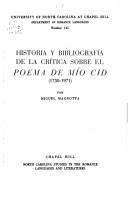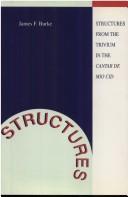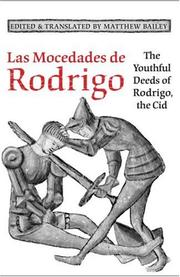| Listing 1 - 4 of 4 |
Sort by
|

ISBN: 1469646242 9781469646244 0884389456 9780884389453 9780807891452 Year: 1976 Publisher: Chapel Hill, NC : University of North Carolina Press,
Abstract | Keywords | Export | Availability | Bookmark
 Loading...
Loading...Choose an application
- Reference Manager
- EndNote
- RefWorks (Direct export to RefWorks)
Cid, --- Romances --- History and criticism. --- Cantar de mío Cid --- Cantar de mío Cid. --- Edición compuesta de la transcripción moderna en verso-romance del Cantar de mío Cid --- Poema del Cid --- Poema de mío Cid --- Poem of the Cid --- Cid (Epic cycle) --- Bibliography.

ISBN: 0802059473 1282039857 9786612039850 1442680245 9781442680241 9780802059475 9781282039858 Year: 1991 Volume: vol 66 Publisher: Toronto, [Ontario] ; Buffalo, [New York] ; London, [England] : University of Toronto Press,
Abstract | Keywords | Export | Availability | Bookmark
 Loading...
Loading...Choose an application
- Reference Manager
- EndNote
- RefWorks (Direct export to RefWorks)
The medieval poem Cantar de Mio Cid is one of the great works of Spanish literature. Its precise date is uncertain, and its author has never been identified. Some scholars believe that it was written by many authors who, over time, adapted earlier material. In this study James Burke considers the authorship of the poem as revealed in key structural components. Placing the Cantar de Mio Cid more in the emerging culture of writing than in the sphere of oral poetry, Burke maintains that the text was produced in a manner typical for the Middle Ages by a writer who followed procedures very specific to the period.Medieval writers were invariably educated in the basic subjects of the trivium: grammatica, rhetorica, and dialectica, taught in the 'middle schools' of the twelfth century. In the process they acquired techniques that enabled them to rewrite pre-existing materials of an authoritative character, emphasizing themes and ideas important for contemporaries.Burke argues that someone rewrote epic material having to do with the Cid in this way. Referring to a device described by the twelfth-century Spanish philosopher Dominicus Gundissalinus as 'the imaginative, poetic syllogism,' Burke identifies three instances of the device in the Cantar de Mio Cid. They support themes and motifs of awakening, manifestation, and revelation, and of the hero as exemplar.This volume sheds new light on a central work in Spanish literature and on medieval poetry in general.
Literature, Medieval --- Poetics --- Themes, motives. --- History --- Cantar de mio Cid. --- Cantar de mio cid. --- Bivar Rodrigo, Díaz de, --- Campeador, --- Cid Campeador, --- De Vivar, Rodrigo Díaz, --- Díaz de Bibar, Rodrigo, --- Díaz de Vivar, Rodrigo, --- Díaz de Vivar, Ruy, --- Díaz, Rodrigo, --- El Cid, --- Vivar, Rodrigo Díaz de, --- Edición compuesta de la transcripción moderna en verso-romance del Cantar de mío Cid --- Poema del Cid --- Poema de mío Cid --- Poem of the Cid --- Cid, --- Romances --- History and criticism. --- Cid (Epic cycle) --- Cantar de mío Cid. --- Cantar de mio Cid --- Rodericus, --- Rodrigo Díaz,

ISBN: 9780802093363 0802093361 1442615958 1442669381 1442684496 9781442684492 9781442669383 9781442615953 Year: 2007 Volume: 110 Publisher: Toronto, [Ontario] ; Buffalo, [New York] ; London, [England] : University of Toronto Press,
Abstract | Keywords | Export | Availability | Bookmark
 Loading...
Loading...Choose an application
- Reference Manager
- EndNote
- RefWorks (Direct export to RefWorks)
For those interested in the poetry of medieval Spain, the epic tradition, or for anyone looking for a good adventure story, Las Mocedades de Rodrigo will be essential reading.
Epic poetry, Spanish --- Spanish poetry --- Poésie épique espagnole --- Poésie espagnole --- History and criticism. --- Histoire et critique --- Cid, --- Poetry. --- Mocedades de Rodrigo. --- Poésie épique espagnole --- Poésie espagnole --- Bivar Rodrigo, Díaz de, --- Campeador, --- Cid Campeador, --- De Vivar, Rodrigo Díaz, --- Díaz de Bibar, Rodrigo, --- Díaz de Vivar, Rodrigo, --- Díaz de Vivar, Ruy, --- Díaz, Rodrigo, --- El Cid, --- Vivar, Rodrigo Díaz de, --- Crónica rimada del Cid. --- Rodrigo y el rey Don Fernando --- Mocedades del Cid --- Cantar de Rodrigo --- Poema de Rodrigo --- Mocedades de Rodrigo --- Crónica rimada de las cosas de España desde la muerte del rey Don Palayo hasta Don Fernando "el Magno," y más particularmente de las aventuras del Cid --- Cid (Epic cycle) --- Rodericus, --- Rodrigo Díaz,
Book
ISBN: 1280125942 9786613529800 0226016196 9780226016191 9781280125942 9780226016214 0226016218 Year: 2012 Publisher: Chicago : University of Chicago Press,
Abstract | Keywords | Export | Availability | Bookmark
 Loading...
Loading...Choose an application
- Reference Manager
- EndNote
- RefWorks (Direct export to RefWorks)
Geographies of Philological Knowledge examines the relationship between medievalism and colonialism in the nineteenth-century Hispanic American context through the striking case of the Creole Andrés Bello (1781-1865), a Venezuelan grammarian, editor, legal scholar, and politician, and his lifelong philological work on the medieval heroic narrative that would later become Spain's national epic, the Poem of the Cid. Nadia R. Altschul combs Bello's study of the poem and finds throughout it evidence of a "coloniality of knowledge." Altschul reveals how, during the nineteenth century, the framework for philological scholarship established in and for core European nations-France, England, and especially Germany-was exported to Spain and Hispanic America as the proper way of doing medieval studies. She argues that the global designs of European philological scholarship are conspicuous in the domain of disciplinary historiography, especially when examining the local history of a Creole Hispanic American like Bello, who is neither fully European nor fully alien to European culture. Altschul likewise highlights Hispanic America's intellectual internalization of coloniality and its understanding of itself as an extension of Europe. A timely example of interdisciplinary history, interconnected history, and transnational study, Geographies of Philological Knowledge breaks with previous nationalist and colonialist histories and thus forges a new path for the future of medieval studies.
Philology --- Medievalism --- Middle Ages --- Postcolonialism --- Epic literature, Spanish --- Spanish epic literature --- Spanish literature --- Post-colonialism --- Postcolonial theory --- Political science --- Decolonization --- Dark Ages --- History, Medieval --- Medieval history --- Medieval period --- World history, Medieval --- World history --- Civilization, Medieval --- Renaissance --- History --- Study and teaching --- History and criticism. --- Bello, Andrés, --- A. B. --- B., A. --- Bello López, Andrés de Jesús María y José --- Cid (Epic cycle) --- Cid Campeador (Epic cycle) --- Historia Roderici --- Crónica rimada del Cid --- Cantar de mío Cid --- postcolonial, postcolonialism, postcoloniality, transatlantic, international, global, academic, scholarly, research, analysis, textbook, professor, college, university, geography, medieval, medievalism, history, historical, 19th century, hispanic american, creole, andres bello, life story, biography, biographical, case study, venezuela, grammar, grammarian, legal, law, politics, philological, hero narrative, spain, poem of the cid, poetry, france, england, germany, local.
| Listing 1 - 4 of 4 |
Sort by
|

 Search
Search Feedback
Feedback About
About Help
Help News
News